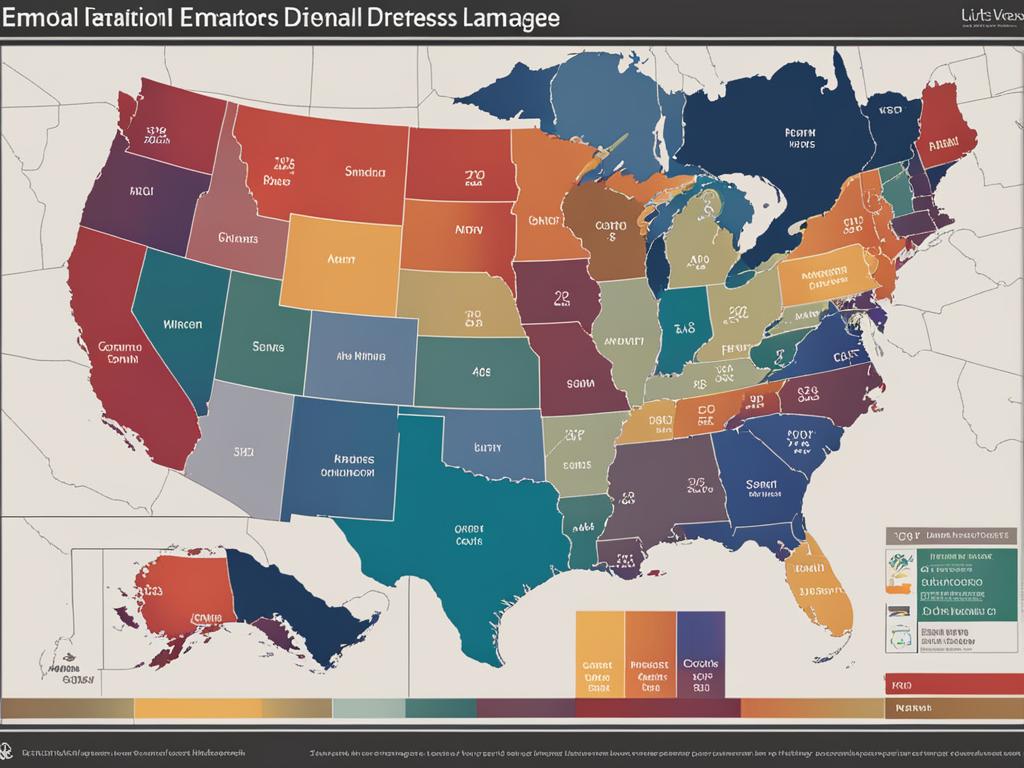Sue Landlord for Emotional Distress: How Much?
Tenant and landlord lawsuits have become increasingly common in recent years, particularly due to the COVID-19 pandemic and its economic repercussions. While it is possible for tenants to sue their landlords for emotional distress, it is essential to understand the complexities involved and the specific legal requirements that must be met for a successful claim.
Winning emotional distress lawsuits against landlords can be challenging, as many cases are dismissed without consideration. To have a strong case, tenants must provide solid evidence and meet certain legal criteria. It is crucial to establish that the emotional distress was caused by the landlord’s intentional or negligent actions and demonstrate the resulting damages.
In this article, we will discuss the process of suing a landlord for emotional distress, the legal rights tenants have in such cases, state variations in emotional distress laws, the elements necessary to prove an outrageous and intolerable cause of action, and legitimate grounds for legal action against landlords.
Key Takeaways:
- Tenants can sue landlords for emotional distress, but winning such cases can be challenging.
- Legal requirements include providing evidence of the landlord’s intentional or negligent actions causing emotional distress and demonstrating resulting damages.
- State laws regarding emotional distress claims against landlords may vary.
- To prove an outrageous and intolerable cause of action, tenants must demonstrate that the landlord’s behavior went beyond the bounds of decency.
- Legitimate grounds for legal action against a landlord include breach of lease agreements, unsafe living conditions, failure to return a security deposit, and illegal rent increases.
Can Tenants Sue Landlords for Emotional Distress?
Yes, tenants have the legal right to sue landlords for emotional distress if they believe that the landlord’s intentional or negligent actions have caused them severe emotional injuries. However, it’s important to note that having the right to sue doesn’t guarantee that the court will award damages. To have a successful claim, tenants need to provide verifiable proof to support their allegations of intentional infliction of emotional distress.
Emotional distress claims against landlords can be challenging to prove, as the burden of proof lies on the tenant. It’s essential to gather evidence to support the claim, such as any documented incidents, witnesses, or communication that shows the landlord’s intentional or negligent behavior.
In some cases, tenants may need to demonstrate that the emotional distress they experienced was severe and debilitating, significantly impacting their daily life and well-being.
Proving Intentional Infliction of Emotional Distress
When pursuing an emotional distress claim against a landlord, tenants need to meet certain legal requirements. To prove intentional infliction of emotional distress, the tenant must show:
- The landlord’s conduct was intentional or reckless
- The behavior of the landlord was extreme and outrageous
- The tenant suffered severe emotional distress as a direct result of the landlord’s actions
- The distress was not merely a result of the tenant’s subjective feelings, but objectively severe
Establishing these elements can be challenging, as the tenant needs to provide substantial evidence to support the claim.
“It is not enough that the defendant negligently or intentionally engaged in some conduct that caused emotional distress. The defendant’s conduct must have been extreme and outrageous.”
– California Civil Jury Instructions (CACI)
Legal Rights for Emotional Distress Claims Against Landlords
Tenants have the right to a safe and habitable living environment and can seek legal recourse if their landlord’s actions have caused emotional distress. By filing a civil lawsuit, tenants can hold their landlords accountable for any harm caused.
However, each state has its own laws and statutes regarding emotional distress claims, so it’s crucial to familiarize oneself with the specific legal rights and requirements within the jurisdiction.
| State | Specific Laws | Procedures |
|---|---|---|
| California | Landlord liability for intentional infliction of emotional distress (CC § 1940.2) | File a complaint with the court within the statute of limitations |
| Texas | Tenant’s rights to peaceful enjoyment (TX 92.056) | Present evidence of emotional distress during the eviction hearing |
| New York | Warranty of habitability (NY RPL § 235-B) | File a claim in housing court for breach of warranty of habitability |
| Florida | Breach of lease agreement | File a lawsuit in small claims court for damages |
It’s important for tenants to consult with an experienced attorney who specializes in landlord-tenant law to understand their legal rights, gather evidence, and navigate the legal process effectively.
Variations by State for Landlord Emotional Distress Lawsuits
Landlord-tenant laws related to emotional distress lawsuits differ from state to state, with specific requirements that must be met for such claims. While the general elements necessary to establish a case may be similar across states, the specific criteria can vary.
In most states, tenants filing emotional distress lawsuits against landlords need to prove that the landlord’s actions were outrageous and intolerable. This requires demonstrating behavior that goes beyond acceptable norms and violates generally accepted standards of decency and morality.
An essential aspect of emotional distress claims is establishing a loose relationship between the landlord’s actions and the damages inflicted on the tenant. This connection helps substantiate the claim that the landlord’s behavior directly caused emotional harm to the tenant.
Evidence of verifiable injuries and damages is crucial in emotional distress lawsuits. Tenants need to provide proof that they have suffered emotional harm as a direct result of the landlord’s actions. Documentation of medical treatment, therapy sessions, or other related expenses can strengthen the case.
However, it’s important to note that the specific requirements for emotional distress claims against landlords may differ based on the state. It is advisable for tenants to consult with a local attorney who specializes in landlord-tenant law to understand the specific laws and regulations in their jurisdiction.
To illustrate the variations and commonalities across states regarding landlord emotional distress laws, the following table provides a summary:
| State | Requirements for Emotional Distress Lawsuits | Notable Variations |
|---|---|---|
| California | Outrageous and intolerable conduct by the landlord, loose relationship between actions and damages, verifiable injuries and damages. | Higher standards of proof for emotional distress claims, considering the level of landlord negligence or intentional misconduct. |
| Texas | Outrageous and intolerable conduct by the landlord, direct relationship between actions and damages, verifiable injuries and damages. | Statute of limitations for emotional distress claims may vary depending on the circumstances surrounding the case. |
| New York | Outrageous and intolerable conduct by the landlord, causal connection between actions and damages, verifiable injuries and damages. | Emphasis on demonstrating severe emotional harm caused by the landlord’s conduct. |
Understanding the specific requirements and variations by state is crucial when considering emotional distress lawsuits against landlords. Consulting with an attorney who specializes in landlord-tenant law can help tenants navigate the legal landscape and increase their chances of a successful claim.

Elements Necessary to Prove an Outrageous and Intolerable Cause of Action
To succeed in an emotional distress lawsuit against a landlord, the tenant must demonstrate several key elements. It is essential to prove that the landlord’s conduct went beyond the bounds of decency—any reasonable person would find the behavior atrocious and utterly intolerable in a civilized community. The judge takes several factors into account when determining if the landlord’s actions violated generally accepted standards of decency and morality:
- The tenant-landlord relationship: The nature of the relationship between the tenant and the landlord and the power dynamics involved can play a crucial role in establishing liability. For example, if the landlord abuses their authority or takes advantage of the tenant’s vulnerability, it strengthens the case for outrageous and intolerable conduct.
- Abuse of authority: If the landlord abuses their position of power or engages in actions that are clearly outside the scope of their duties, it can contribute to proving outrageous conduct. This may include harassment, invasion of privacy, or intentional infliction of emotional harm.
- The tenant’s vulnerability: The tenant’s vulnerability, whether due to age, physical or mental health condition, or other circumstances, can be relevant when assessing the impact of the landlord’s conduct. The court considers whether the landlord took advantage of the tenant’s vulnerable state or intentionally caused additional distress.
- Ongoing nature of the conduct: The persistence and repetitiveness of the landlord’s behavior are significant factors in determining whether it rises to the level of outrageousness. Sustained and continuous actions that cause severe emotional distress over an extended period increase the chances of establishing liability.
“The key to proving outrageous and intolerable conduct is to demonstrate that the landlord’s behavior goes beyond what society deems acceptable. The tenant must show that the actions were so extreme, egregious, and morally repugnant that they caused significant emotional harm.”
By presenting robust evidence that highlights these elements, tenants can strengthen their case in an emotional distress lawsuit against their landlord.
Legitimate Reasons to Sue Your Landlord
Tenants have valid grounds for taking legal action against their landlords in certain situations. It’s important to understand the legitimate claims that can be made against landlords to ensure a strong case. Let’s explore some reasons why tenants may choose to sue their landlords:
Breach of Lease Agreements
One common reason to sue a landlord is when they fail to uphold their obligations as specified in the lease agreement. This could include violating terms related to maintenance and repairs, providing essential services, or following proper eviction procedures.
Unsafe or Uninhabitable Living Conditions
If a landlord fails to maintain a safe and habitable living environment, tenants may have a legitimate claim for legal action. Examples of unsafe conditions include mold infestations, plumbing or electrical issues, pest problems, inadequate heating or cooling, or other health hazards.
Failure to Return the Security Deposit
When a rental agreement ends, landlords are typically required to return the tenant’s security deposit within a specified timeframe, minus any lawful deductions. If the landlord unreasonably withholds the security deposit or fails to provide an itemized list of deductions, tenants may have grounds for a lawsuit.
Illegal Rent Increases
In some cases, landlords may illegally raise the rent beyond the limits set by local rent control laws or regulations. If tenants can prove that the landlord imposed an unauthorized rent increase, they may have a valid claim for legal action.
While these are some common legitimate reasons to sue a landlord, it’s crucial for tenants to gather evidence and follow proper legal procedures to strengthen their case. Consulting with an attorney who specializes in landlord-tenant law can provide valuable guidance and increase the chances of a successful outcome.

Summary
Understanding the legitimate reasons to sue a landlord is vital for tenants seeking recourse in challenging situations. Breach of lease agreements, unsafe living conditions, failure to return the security deposit, and illegal rent increases are all valid grounds for legal action. However, tenants should provide evidence, follow proper legal procedures, and seek professional advice to strengthen their case and increase their chances of success.
Gathering Evidence and Contacting an Attorney
Before pursuing an emotional distress lawsuit against a landlord, tenants should gather as much evidence as possible to support their case. This evidence may include any threatening communication from the landlord, photographic or video evidence of unsafe living conditions, or proof of failure to return a security deposit. It is highly recommended for tenants to consult an attorney who specializes in landlord-tenant law to assess the strength of their case and provide guidance throughout the legal process.
Gathering evidence is crucial in emotional distress lawsuits, as it helps establish the validity of the tenant’s claims. The evidence may vary depending on the specific circumstances of the case, but some common types of evidence include:
- Written or electronic communications: Save any emails, text messages, or letters exchanged with the landlord that demonstrate their negligence, disregard for tenant rights, or intentional infliction of emotional distress.
- Photographic or video evidence: Document any hazardous or unsafe conditions in the rental property, such as mold, pests, structural issues, or other environmental hazards.
- Witness testimony: If there were witnesses to the landlord’s abusive behavior or the unsafe living conditions, gather their contact information and ask them to provide a statement or testify if necessary.
- Financial documentation: Keep records of any expenses incurred as a result of the emotional distress, such as medical bills, therapy costs, or relocation expenses.
By gathering strong evidence, tenants can strengthen their case and increase their chances of a favorable outcome. However, navigating the legal complexities of an emotional distress lawsuit can be challenging. That’s why consulting an attorney experienced in landlord-tenant law is crucial.
Importance of Legal Representation
Consulting an attorney for tenant rights is essential for several reasons:
- Legal expertise: An attorney specializing in landlord-tenant law understands the intricacies of emotional distress lawsuits and can provide valuable legal advice tailored to the individual case.
- Case evaluation: An attorney can assess the strength of the tenant’s case, identify any potential legal issues or weaknesses, and guide the tenant on the best course of action.
- Negotiation and settlement: An attorney can negotiate with the landlord or their legal representation, aiming for a favorable settlement that compensates the tenant for their emotional distress adequately.
- Court representation: If the case goes to trial, an attorney will represent the tenant in court, presenting the evidence, questioning witnesses, and making persuasive arguments to support the claim.
Having legal representation in landlord disputes provides tenants with the support, guidance, and expertise needed to navigate the legal complexities of emotional distress lawsuits effectively. It ensures that their rights are protected, and they have the best chance of obtaining the compensation they deserve.
| Gathering Evidence Checklist: | Contacting an Attorney Checklist: |
|---|---|
| Save written or electronic communications with the landlord. | Consult an attorney specializing in landlord-tenant law. |
| Document hazardous or unsafe conditions in the rental property. | Seek legal advice on the strength of the case. |
| Collect witness testimony, if available. | Negotiate with the landlord or their legal representation. |
| Keep records of expenses related to emotional distress. | Receive court representation if the case goes to trial. |
Filing a Claim and Taking the Case to Trial
Once tenants have gathered sufficient evidence and consulted with an attorney, they can proceed to file a claim for intentional or negligent infliction of emotional distress against their landlord.
If both parties are unable to reach a settlement through negotiation or mediation, the case will proceed to trial. During the trial, tenants and landlords will have the opportunity to present their evidence and arguments before a judge or jury.
It is essential for tenants to clearly demonstrate that the landlord’s behavior caused them severe emotional distress. To establish liability, tenants must provide evidence that meets the necessary legal elements for an emotional distress claim against a landlord.
Throughout the trial, the court will follow specific procedures to ensure a fair and structured process. Both parties will have the chance to present witnesses, cross-examine opposing witnesses, and argue their case.
Ultimately, the judge or jury will evaluate the evidence presented and determine whether the landlord should be held accountable for the emotional distress inflicted upon the tenant.

The Legal Process for Emotional Distress Claims Against Landlords
| Steps | Details |
|---|---|
| 1. Filing the Lawsuit | Submit a complaint or petition to the appropriate court, outlining the tenant’s claims and providing supporting evidence. |
| 2. Serving the Defendant | The tenant must serve the landlord with a copy of the lawsuit to ensure they are aware of the legal action being taken against them. |
| 3. Discovery Phase | Both parties exchange information and evidence, including documents and witness testimonies, to build their case. |
| 4. Pre-Trial Motions | Either party may file motions to request the court to make specific rulings or dismiss certain aspects of the case. |
| 5. Trial | The tenant and landlord present their evidence and arguments in court, allowing the judge or jury to make a decision. |
| 6. Verdict and Judgment | The court determines the outcome of the case, either finding the landlord liable for emotional distress or ruling in favor of the landlord. |
Filing a lawsuit for emotional distress against a landlord involves a legal process that requires careful preparation, presentation of evidence, and adherence to court procedures. Consulting with an attorney who specializes in landlord-tenant law can provide tenants with the guidance and expertise needed to navigate the complexities of the legal system.
Determining the Amount of Compensation
The amount a tenant can sue their landlord for emotional distress will depend on several factors. These factors include the severity of the landlord’s actions and their financial resources. When calculating damages for emotional distress lawsuits, courts usually consider the following:
- The nature and extent of the emotional distress suffered by the tenant
- The duration and impact of the distress on the tenant’s life
- Any physical symptoms or ailments caused by the distress
- The level of negligence or intentional misconduct on the part of the landlord
Additionally, the court may also take into account the medical bills and lost wages incurred by the tenant as a result of the emotional distress. In some cases, compensation for emotional distress may range from 2 to 5 times the total costs of medical bills and lost wages.
| Factors Considered in Determining Compensation for Emotional Distress | Examples |
|---|---|
| The severity and impact of the emotional distress | A tenant experiencing severe anxiety, depression, and sleep disturbances as a result of the landlord’s actions |
| The duration of the emotional distress | A tenant who has suffered emotional distress for several months or years as a result of ongoing harassment by the landlord |
| The physical symptoms or ailments caused by the distress | A tenant developing high blood pressure or migraines due to the emotional distress caused by the landlord |
| The level of negligence or intentional misconduct by the landlord | A landlord intentionally causing emotional distress by making false accusations or threats against the tenant |
It is important to note that some states may have maximum limits for damages awarded in emotional distress lawsuits. Therefore, the amount of compensation may be subject to these statutory limitations.

By considering these factors, courts aim to provide fair compensation for tenants who have suffered emotional distress due to their landlord’s actions. However, it is important to consult with an attorney experienced in landlord-tenant law to better understand the specific factors and compensation guidelines that apply to your jurisdiction.
Conclusion
In conclusion, suing a landlord for emotional distress is a challenging process that requires strong evidence and legal expertise. While tenants have the right to pursue legal action, success in these lawsuits hinges on meeting specific legal requirements and presenting compelling evidence. To increase their chances of success, tenants should consult with an attorney specializing in landlord-tenant law and diligently follow proper procedures.
Winning an emotional distress lawsuit against a landlord involves proving that the landlord’s conduct went beyond acceptable bounds, was atrocious and intolerable, and caused severe emotional injuries. Additionally, tenants must navigate the variations in landlord emotional distress laws across states, which may have different requirements for establishing liability.
Overall, tenants who wish to pursue legal action against their landlords for emotional distress should be prepared for a complex and lengthy process. By seeking legal representation, gathering sufficient evidence, and meticulously following legal procedures, tenants can increase their chances of obtaining the compensation they deserve.
FAQ
Can I sue my landlord for emotional distress? How much can I sue for?
Yes, tenants have the right to sue their landlords for emotional distress. The amount you can sue for depends on several factors, including the severity of the landlord’s actions and their financial resources. Typically, compensation for emotional distress may range from 2 to 5 times the total costs of medical bills and lost wages. However, some states may have maximum limits for damages awarded in emotional distress lawsuits.
What are the legal requirements for emotional distress claims against landlords?
To successfully sue your landlord for emotional distress, you must establish certain elements. These include proving that the landlord’s actions were outrageous and intolerable, showing a connection between the landlord’s actions and the damages, and providing evidence of verifiable injuries and damages. The specific requirements may vary depending on the state.
Can tenants sue landlords for emotional distress in every state?
Yes, tenants have the right to sue landlords for emotional distress in every state. However, the specific laws and requirements may vary. It’s important to consult an attorney familiar with landlord-tenant laws in your state to understand the specific regulations and procedures.
What are the legitimate reasons to sue a landlord for emotional distress?
Some legitimate reasons for suing a landlord for emotional distress include breach of lease agreements, unsafe or uninhabitable living conditions, failure to return the security deposit, and illegal rent increases. It’s crucial to gather evidence to support your case and consult with an attorney specializing in landlord-tenant law.
What steps should I take before filing an emotional distress lawsuit against my landlord?
Before filing a lawsuit, it’s essential to gather evidence to strengthen your case. This evidence may include threatening communication from the landlord, photographic or video evidence of unsafe living conditions, or proof of failure to return a security deposit. It’s highly recommended to consult with an attorney who specializes in landlord-tenant law to assess the strength of your case and provide guidance throughout the legal process.
What is the process for filing an emotional distress lawsuit against a landlord?
After gathering evidence and consulting with an attorney, you can proceed to file a claim for intentional or negligent infliction of emotional distress. If a settlement cannot be reached, the case will go to trial, where both parties will have the opportunity to present their evidence and arguments. It’s important to clearly demonstrate that the landlord’s behavior caused severe emotional distress and meet the necessary elements for liability.
How do courts determine the amount of compensation in emotional distress lawsuits against landlords?
The amount of compensation in emotional distress lawsuits against landlords is determined based on various factors, including the severity of the landlord’s actions and the tenant’s damages. Generally, compensation may range from 2 to 5 times the total costs of medical bills and lost wages. However, specific state laws may impose maximum limits on damages awarded in emotional distress claims.
Is it difficult to win an emotional distress lawsuit against a landlord?
Winning an emotional distress lawsuit against a landlord can be challenging. Many cases are dismissed due to a lack of strong evidence or failure to meet legal requirements. It’s crucial to gather compelling evidence and consult with an attorney specializing in landlord-tenant law to increase your chances of success.
Do I need an attorney to sue my landlord for emotional distress?
While it’s possible to sue your landlord for emotional distress without an attorney, it’s highly recommended to seek legal representation. An attorney can help assess the strength of your case, navigate the legal process, gather evidence, and present your arguments effectively in court.

